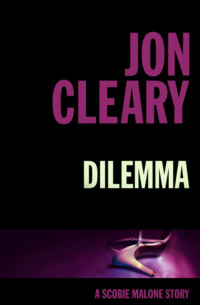
Полная версия
Winter Chill
‘Nothing.’ He couldn’t tell her he had been looking for a sign of death here in the silent street. Don’t be so bloody Irish … But were Celts the only people afraid of shadows? He must ask Clarrie Binyan some time if the Aborigines, the Koories, kept looking over their shoulders. Probably: more so than the Irish. ‘The security guard, Rockman – did you do him?’
‘He hasn’t been done yet. Tomorrow morning, first thing. If the bullet’s still in him, I’ll hand it to Ballistics right away.’ She got into her car, holding the door open while she looked up at him. In the door-light he could see the strain in her lovely, square-jawed face; her dark hair had been blown into a tangle and evidently she hadn’t bothered to comb it. She and Lisa must have been too concerned with other things … Again he was angry at his pessimism. ‘I gave up going to church years ago, we were Lutheran. But I’ll be praying for you. You Catholics like Hail Marys, don’t you?’
‘We’ll take anything you care to say.’
He closed the car door, the light went out. He watched her drive away. Her mother had died of sunstroke two years after coming from Germany to start a new life in the sunshine of Australia; her father, a triple murderer, had suicided. She knew all about the shadows of death, and not just because she worked in a morgue.
He went into the house, sat down beside Lisa to watch the seven o’clock news. ‘Not getting dinner?’
‘The kids are getting it,’ she said. ‘They insisted.’
He held her hand. On the screen in front of them the world, as usual, was falling apart; only calamity was news. ‘Any word when you go into hospital?’
‘Sunday. They’ll operate Monday morning.’ She felt the tension in him and she looked at him, leaning forward. ‘Don’t worry.’
‘Aren’t you worried?’
‘Of course I am. But I’m not going to sit around asking Why me? Self-pity is no medication. I’ll be all right.’
He kissed her, his arm round her shoulders, holding her tight. Then past the curtain of her loose-hanging hair he saw Maureen standing in the doorway, smiling at them. ‘They’re at it again,’ she said over her shoulder to her siblings in the kitchen. Then, still smiling at them, ‘Dinner’s ready.’
His heart ached, which did nothing for his appetite, even though Claire and Maureen had cooked his favourite, steak-and-kidney pie, and Tom had opened a bottle of Riddoch ’86 shiraz for him and Lisa. Still, for all their sakes, he did his best.
Later, in bed, Lisa said, ‘You’d better grab what you can between now and Monday. After that there’s not going to be much sex for a while.’
‘I’ll join the Vice Squad, pick up a bit down in William Street.’ He held her to him, treasuring every familiar curve and hollow of her. ‘Romy says there may be some chemotherapy after it.’
‘That’s the bit that upsets me. It can make some people very sick.’ Then she lay away from him in the darkness. ‘You haven’t said a word how work is going.’
‘I don’t think it’s important, is it? To us?’
‘It is!’ With one arm still under her, he felt her stiffen. ‘People dying, being murdered, is important! God, darling, don’t lose your perspective!’
He recognized that her anger was really fear; it would be cruel to argue with her. ‘Righto, it’s important. But I’ve never brought the cases home, not unless you’ve asked me—’
‘I’m asking you now.’ It was an order. Fear took many forms: hers would never be a quaking surrender.
Flatly, listlessly, he told her of the Brame and Rockman cases, of the lack of leads. ‘I’ve met two wives so far, the brothers’ wives. One of ’em could whip the UN into shape, the other one couldn’t run a school bazaar without a snort of some kind.’
‘She’s a drunk?’
‘Drugs. I don’t mean she’s a junkie, she’s just one of those women scared out of her pants by how far her husband’s gone.’
‘That’s the American wife?’
‘No, the Aussie one, Mrs Channing. Not that I think Channing himself has got as far as he’d hoped. In his own way he’s as unsure of himself as she is.’
‘They’re often the ones who drive their wives the hardest.’
‘When you’re out of hospital and cured, you want to join Homicide as a counsellor?’ He kissed her, patted her mount but went no further. ‘I’m just glad you never drove me.’
‘You never needed it. You just had to be steered, that was all.’
She knew his every weakness, including his overwhelming love for her.
4
Chief Superintendent Greg Random had come across to the morning conference from Police Centre. ‘President Clinton, him and everyone down as far as me, we’re all looking for a quick solution to the Brame case. I just thought you’d like to know.’
He never pressured any of the men under him; he had his own quiet way of ensuring efficiency. He had total confidence in Malone; he had been Malone’s boss in Homicide until he had been promoted to the desk job he hated. At the moment he was resisting a new directive that wanted all police to be shifted every three years from one division to another. The directive was aimed at stalling corruption, at breaking up any too-cosy relationship between police and their contacts, ignoring the fact that cops and crims were two sides of the same coin. Headquarters was evidently under the impression that informers stood on street corners, like hookers, waiting for cops with ready money. Ivory towers, Random had confided to Malone, were not confined just to academe.
‘The Commissioner tells me the FBI has offered to help and he’s expecting to hear from the CIA, the National Security Council, NASA and the Daughters of the American Revolution any minute now. Seven hundred and forty district attorneys have offered to prosecute and the US Supreme Court will take over if our judges find it’s too much for them. In other words, the bullshit has hit the fan. Excuse me, Detective Smith,’ he said, for the moment carried away by his sarcasm.
‘Can I get you some coffee, sir?’ Peta Smith half-rose from her chair.
‘Are you getting it for everyone?’ Random looked around the all-male-but-one conference.
‘No, sir. Just for you.’ With not a glance at any of the other men.
His lean, lined face eased itself into a slow paternal smile. ‘Better leave it, Peta. Otherwise this mob will think it’s favouritism … So what have you got, Scobie?’
‘Clarrie Binyan, over at Ballistics, called me. The bullet taken out of the security guard, Murray Rockman – it’s the same calibre as the one taken out of Orville Brame, a rare ’un, a nine-millimetre ultra. Clarrie says he’s making a guess, but he thinks there wouldn’t be too many guns in this country that take that sort of bullet. One of them is a Sig-Sauer, made for a Swiss company but manufactured in Germany. It will take a silencer, which Clarrie thinks would have been used, and it’s a pretty expensive piece, not the sort your ordinary hoodlum would use.’
‘He’s guessing?’
‘Of course. But that’s all any of us are doing at the moment. The point is, they’ve made their first mistake – they’ve made a connection for us.’
‘And what’s the connection?’
Malone grinned: to an outsider it might have looked like embarrassment. ‘That’s it. The bullet. We start from there.’
‘That’s not much to tell President Clinton.’
Malone suddenly realized that, for all his relaxed air, Greg Random was under pressure. Perhaps not from President Clinton, but the local political pressure would be just as heavy. In his mind’s eye he saw the weight, like heavy die-stamps, falling on Random’s neck: the Premier, the Minister, the Commissioner.
‘No, it’s not much. But why would the one gun be used, on separate nights, to kill a top American lawyer, here in Australia for the first time in thirty years, and a local security guard who’s got nothing but a clean record and, as far as we know, never met the lawyer? All we have to do is start at either end and work towards the middle.’
‘I’ll tell Bill Clinton that.’ Random rose to his feet. ‘Maybe it’s the solution to his national debt. Let me know when you’ve come up with your solution. Yesterday will be soon enough.’
He went his unhurried way out of the big room, leaving Homicide looking at their boss. Malone spread his hands. ‘Any suggestions?’
Two-thirds of those at the table rose from their chairs. ‘It’s all yours, Scobie. We’ve got the one out at Penshurst.’ And at Cronulla and Bondi and elsewhere: simple homicides, of plain people with no political pull.
Then Andy Graham, who had not been present at the conference, came in. ‘The Chief would like to see you outside, Scobie. He’s waiting on the front steps.’
Puzzled, Malone went out to the entrance. Random was there, his familiar pipe, always unlit, stuck between his teeth. ‘Walk up to the corner with me, Scobie.’
The sky was clear today, there was no wind and the sun, though not warm, was bright, throwing pale shadows. Up ahead, on the other side of the road, was the concrete fortress of Police Centre; Malone sometimes wondered if it had been built as the last bunker of a Police Service that appeared always to be defending itself. Random paused outside a deserted restaurant car park. It struck Malone that he had chosen a spot where whatever he had to say he would not be overheard.
‘Russ told me about your wife. I’m sorry to hear it. Cancer’s a real bugger. My wife had a breast removed six years ago.’
‘I didn’t know—’
‘Well, you don’t broadcast your worries … When’s she being operated on?’
‘Next Monday.’
‘Okay, take leave from Saturday night. Russ can take over from you.’ Then he took his pipe out of his mouth and looked at it as if wondering why he was holding it. ‘Unless you want to take leave now?’
‘No. Lisa insists I keep working. But I’ll go off Saturday night. Thanks, Greg.’ He sighed, feeling drained of energy. ‘I don’t like leaving this Brame case. Or the other one, the security guard. Are you getting pressure?’
‘Am I? Have you ever had the chain of command wrapped around your neck? You’d think the Pope’d been done in, not just a bloody lawyer. But never mind, do what you can up till the weekend. Then stay home with your wife. Give her my best. A nice woman.’
He abruptly left Malone, not rudely but because that was his way. Malone stood a moment, then jumped as a car, wanting to turn into the car park, tooted its horn. He walked back to the Hat Factory, apprehensive that one day he might be sitting in Random’s chair. The chain of command, when applied by political pressure, could be a garrotte.
Clements and Andy Graham were waiting for him in his office. ‘Andy’s heard from the FBI.’
‘They’re thorough,’ said Graham. ‘They’ve come up with nothing on our friend Murray Rockman.’
Malone dropped into his chair. ‘Sort that one out for me, Andy. They’re thorough and they’ve come up with nothing?’
Graham looked flustered, one of his usual expressions. ‘Yeah, I see what you mean. No, they’ve done their homework. They’ve been through all the records in Caswell, Ohio. Birth registration, high school, everything. They’ve checked the Marines, their enlistments, their service records. No Murray Rockman, ever. In either place, Caswell, Ohio, or the Marines. Nothing.’ He handed Malone the fax he held. ‘Our guy never existed before he came to Australia.’
Chapter Four
1
The De Vries family had been lawyers for over three hundred years, ever since their arrival in New Amsterdam from Utrecht. Dutch Catholics, they had little to do with the predominant Dutch Calvinists and looked elsewhere for clients amongst the growing polyglot citizens of that growing city. Hendrik De Vries, the original immigrant, built up a clientele amongst the Jews from Spain and Portugal, and he passed on the practice to his two sons. Over the succeeding years, as New Amsterdam became New York, the fortunes of the family firm both flourished and flopped; as in all families that manage to survive the generations, it suffered occasionally from drunks, fools and incompetents. Eventually the firm, to survive, had to merge with Schuyler and Barrymore, to become Schuyler, De Vries and Barrymore. There was no Schuyler now on the board of partners and the last Barrymore had disappeared at the end of World War Two. There was, however, still a De Vries: Richard De Vries the Third. He was no drunk, fool nor incompetent; but the margin for error, on all counts, was narrow. Still, he owned 30 per cent of the stock and stock ownership has its own competence, as the other partners, when pressed, heartily agreed. Dick De Vries was kept afloat by money, which is more buoyant than balloons on Wall Street.
‘I came as soon as I could—’ He was a small man with a round face, flushed from too much claret and Scotch, and reproachful brown eyes, as if he blamed others for his failings. He had silver hair, parted in the middle like that of a dandy from the Twenties, and tiny ears laid flat along his skull. Though he had just got off a fourteen-hour flight, he was dressed as if on his way to the offices in Broad Street, Manhattan. He wore a dark grey suit from Fioravanti, a custom-made shirt from Kabbaz, a Racquet-club tie and black wing-tips by Vogel. Not for him French shirts and English suits and shoes: he was Ail-American. Except for his clipped accent: as a young man he had always tried to imitate Ronald Colman and Robert Donat and now the voice came naturally to him.
He even dresses and speaks like a lie, thought Joanna Brame: inside there is an untidy, useless little man trying to get out. Orville had told her that several times.
‘Have they released the – er – body yet?’
‘Not yet. Australians, it seems, have a fetish for red tape. Did you have a good flight?’ Why am I asking him that? she wondered. But she had always had difficulty trying to keep a conversation going with Dick De Vries.
‘Not really. These days, with a lot of people, the only thing first class about them is their ticket.’ She agreed with him, but she wouldn’t tell him so. ‘To cap it all, everything here in Sydney is booked out. I’m having to share a room, something I haven’t done since I was in college.’
‘Whom with?’ She still had the precision in grammar that her mother, who had sat at the feet of Henry James, had taught her.
‘Young Tallis. It could be worse, I suppose, though there is hardly room to swing a cat. I could be sharing with one of those palimony shysters. Or an ambulance chaser from Chicago.’ He had his own snobbery.
She was not embarrassed that she was staying alone in a suite in which she could have swung a Bengal tiger. She changed the subject: ‘I am still coming to terms with Orville’s death. The way he – he died.’ For just a moment her voice faltered. Last night, lying awake in the strange bed, a huge bed that could have accommodated four people and so had an increased emptiness, reaching out on one occasion for the Orville who wasn’t there, who would never be there again, there had been a long moment when she had wondered at the worth of going on alone; it was uncharacteristic of her to think that way, and she had been both frightened by the thought and embarrassed by it. She went on: ‘The police don’t think it was a mugging, anything like that. Why should anyone want to kill him?’
‘You can’t expect me to answer that? I’ve only just arrived.’ He sounded irritated; but then he often sounded like that. ‘Are the local police any good?’
‘I suppose so. How would I know?’ It was her turn to sound irritated; she despised herself for the pettiness. ‘All police departments are different, I suppose. Just as people are different.’
‘May I?’ He helped himself to his second Scotch from the mobile drinks tray. ‘The first thing, Jo—’ She hated the name Jo, but she didn’t correct him this time. ‘ – The first thing is to get you and Orville on a plane for back home. I’ll stay here and handle things with the police.’
‘His brother came to see me.’
He looked at her (cautiously?) over the rim of his glass. ‘What’s he like?’
She shrugged. ‘I didn’t take to him. He didn’t seem very – upset by Orville’s death. Murder.’
‘From what Orville told me, they were never close.’
She was surprised. ‘He discussed his brother with you?’
Again there was what seemed to her some caution. ‘Once. Maybe twice. I don’t remember how his name came up – oh yes. It was when Sydney was nominated as the venue for this convention. Orville mentioned his brother then. Yes, it was then.’
She was alert to nuances; she would have made a good lawyer. ‘You sound a little hazy about when it was. Never mind,’ she said before he could protest, ‘the brother is here and doesn’t seem too put out by Orville’s murder. I’d better get used to calling it that,’ she added, more to herself than to him.
‘Perhaps I should contact him?’
‘To what purpose? But please yourself.’
‘Will you have dinner with me this evening? I understand the food in Sydney is edible and the wines are excellent.’
‘I wouldn’t be good company, Dick.’
He drained his glass, then stood up. ‘Oh, by the way, did Orville leave any papers here? He brought a stuffed briefcase with him, I believe. Young Tallis told me he was the one who had to carry it. Lug it, was the phrase he used.’
‘It’s in the other room.’ She rose and went into the bedroom. While she was gone he looked at the drinks tray, looked at his glass, then reluctantly put down the glass. When she came back she stopped in the bedroom doorway. ‘It’s not there.’
‘Perhaps Tallis has it?’
‘Perhaps. But he wouldn’t have taken it without telling me—’
‘Have you been out of here since you arrived?’ His voice was quick with concern.
‘No. Yes, yes, of course. I had to go to the morgue on – Monday? Two days ago? God, have I been sitting here that long?’
‘We better get Tallis up here. What’s our room number? Oh, yes.’ He picked up the phone, asked for the room: ‘Adam? Could you come up to Mrs Brame’s suite? Yes, now.’ He sounded irritated again; or edgy. He hung up the phone. ‘We have to find that briefcase.’
‘Pour me a gin-and-tonic, please. Light on the gin,’ she said, remembering his heavy hand. ‘Why did Orville bring papers all the way from New York to here? Were they ABA papers?’
‘Some of them, I guess. Yes, some of them would be. But there would have been others—’
There was a knock on the door; De Vries went to it and opened it. ‘That was quick, Adam.’
‘I came up the stairs, I didn’t wait for the elevator. You said now.’ The young man was not impolite, but Joanna recognized where his loyalties lay; and was pleased for Orville’s sake. ‘Something wrong?’
‘Mr Brame’s briefcase is missing.’
Tallis frowned, looked at Joanna. ‘You sure? It was there – damn! Come to think of it, I haven’t seen it since Sunday afternoon, when I gave it to Mr Brame. He gave it to me to take care of Sunday morning when he went out to see his brother.’
‘He told you he was going to see his brother?’ said De Vries.
‘Yes. He seemed – perturbed? I mean, at meeting him. But he didn’t say why. But what’s happened to the briefcase?’
‘That’s what – perturbs us,’ said De Vries. ‘Did you know what was in it?’
Tallis shook his head. ‘It was locked all the time I had it. Mr Brame never told me the combination. But I can’t understand …’
‘Someone must have taken it while I was out at the morgue on Monday morning. Or – once I went down to the coffee lounge when the maid came in.’ Joanna put down her glass, picked up the phone. ‘I think we should call the police.’
‘No.’ De Vries held up a hand. ‘No, not yet. Let’s make sure no one here in the hotel has it. If there are ABA papers in it, Orville could have given it to one of the other officers. Karl Zoehrer, perhaps. Don’t let’s panic—’
‘I’m not panicking, Dick.’ But Joanna put down the phone.
‘Mr Zoehrer’s over at the Convention Hall,’ said Tallis. ‘There’s a session on international law. He’s chairing it. Mr Brame was scheduled to do it. I’ll go over there now, find out if he has the briefcase.’
As the door closed behind him, De Vries turned to Joanna. ‘We have to retrieve that briefcase and those papers.’
‘That’s why I think we should call in the police. There has to be a connection between it and Orville’s – murder.’
‘I think I need another drink.’ He moved towards the drinks tray.
‘No, I think you should go and lie down, Dick. You look as if you’re suddenly suffering from jet lag.’
Then the phone rang. Reception wanted to know if Inspector Malone could come up to see Mrs Brame.
2
Malone preferred not to interview people on his own, but his resources were spread thin this morning. ‘We want someone here to mind the store,’ he had told Clements. He had looked around the almost empty big room; there were only two detectives at their desks, each of them head bent above papers. ‘You’re it, Russ. You can enjoy yourself answering the phone from the Commissioner, the Minister. Even Bill Clinton. Where’s Andy Graham?’
‘I sent him over to ABS Security to check on Rockman’s references from his other employers. Then he can follow that up by going to see those firms, find out what he can about Rockman.’
‘Peta Smith and John Kagal?’
‘They’re out looking for Rockman’s ex-girlfriend.’ Clements settled back in Malone’s chair. ‘This chair’s a bit tight on the bum. If I’m moving in here next Monday, I’ll bring my own. Good luck with Mrs Brame.’
When Malone knocked on the door of the Brame suite it was opened by a silver-haired man who didn’t seem particularly glad to see him. ‘I’m Richard De Vries. Come in – Inspector, is it? Your ranks are different from ours, aren’t they?’
In contrast to De Vries, Joanna Brame looked pleased to see him. ‘Do come in, Inspector. Have you some good news? Well, no, not good news—’ She gestured, but not vapidly. ‘Why should I be asking for that? If you’ve caught the murderer, it still won’t be good news, will it?’
‘No, Mrs Brame. And we haven’t caught him. I’m sorry to say we’re not much further advanced. Except—’
‘Except?’ De Vries was standing by the drinks tray. ‘Drink?’
‘Mr De Vries is the other senior partner. He arrived from the States only this morning.’
Malone shook his head at the offer of a drink, but noticed that De Vries poured himself a stiff whisky. But before the older man tasted his drink he said, ‘You said except. Except what?’
Malone then explained about the murder of Murray Rockman.
‘He was murdered near here? Is this a dangerous area where the hotel is?’
‘It hasn’t been up till now.’ Malone knew he sounded defensive, like a local city councillor.
‘It’s starting to sound that way now.’
Malone ignored him and looked at Joanna Brame. ‘The bullet that killed the security guard was the same calibre as the one that killed your husband.’
‘But that proves nothing, does it?’ said De Vries, drink still untouched, manoeuvring himself into Malone’s gaze again. ‘How many calibres of bullets are there?’
‘This one is an uncommon one. Our Ballistics unit are looking into it, they think they know the type of weapon that would fire such a bullet.’
‘Are they any good?’
‘Our Ballistics unit? They’re considered as good as any in the world.’
De Vries then took a gulp of his drink and Joanna said, ‘I’m sure Mr De Vries didn’t mean to imply that they were not as good as—’
‘The FBI?’ Malone smiled, but with an effort. He hoped this was not going to develop into a battle of the flags. He was not particularly nationalistic, seeing nationalism only as an upmarket name for tribalism (and look at what that was doing in the rest of the world), but he did have pride in his own Service. ‘We hold our own, Mrs Brame … We’re now trying to find the connection between the two killings. We still don’t know who was the man who spent half an hour with your husband on Sunday night.’ He looked at De Vries, reluctantly. ‘Would Mr Brame have discussed with you meeting anyone in particular while he was out here? A client, maybe?’









